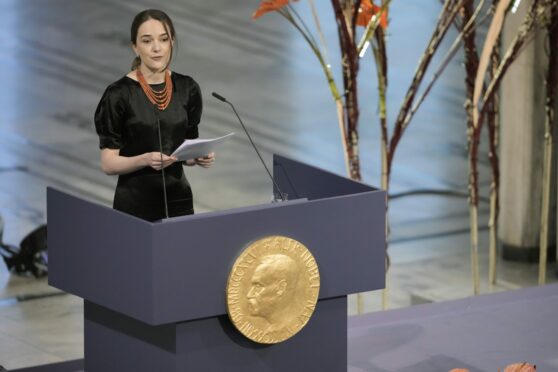
Ukrainian human rights lawyer Oleksandra Matviichuk collected the Nobel Peace Prize yesterday and rejected any suggestion that her country should make a deal with Vladimir Putin to end his invasion.
In a defiant speech at the Stockholm ceremony, Matviichuk said: “Fighting for peace does not mean yielding to pressure of the aggressor, it means protecting people from its cruelty.
“Peace cannot be reached by a country under attack laying down its arms. This would not be peace, but occupation.”
She called the conflict in Ukraine “genocidal” and said that “if Ukraine stops resistance, there will be no more us”.
Matviichuk, of Ukraine’s Centre for Civil Liberties, was named a co-winner of the 2022 peace prize in October along with Russian human rights group Memorial and Ales Bialiatski, head of the Belarusian rights group Viasna.
She repeated her earlier call for Putin — and Belarus’s authoritarian President Alexander Lukashenko, who hosted Russian troops for the invasion of Ukraine — to face an international tribunal.
“We have to prove that the rule of law does work, and justice does exist, even if they are delayed,” she said.
Eight years ago Matviichuk met then-US Vice President JOe Biden when he visited Ukraine, to demand help for her country.
In March, she told The Sunday Post, saying: “He asked what could the United States do to help Ukraine. What did I tell him? I told him: “Give us weapons.”
Bialiatski, who is jailed in Belarus pending his trial and faces a prison sentence of up to 12 years, was not allowed to send his speech. He shared a few thoughts from jail and his wife, Natallia Pinchuk, spoke on his behalf at the award ceremony in Stockhoilm.
“In my homeland, the entirety of Belarus is in a prison,” Bialiatski said in the remarks delivered by Pinchuk — in reference to a sweeping crackdown on the opposition after massive protests against a fraud-tainted vote in August 2022 which Lukashenko used to extend his rule.
“This award belongs to all my human rights defender friends, all civic activists, tens of thousands of Belarusians who have gone through beatings, torture, arrests, prison.”
He is the fourth person in the 121-year history of the Nobel Prizes to receive the award while in prison or detention.
Russia’s Supreme Court shut down Memorial, one of Russia’s oldest and most prominent human rights organisations which was widely acclaimed for its studies of political repression in the Soviet Union, in December 2021.
Jan Rachinsky of Memorial said in his speech: “Today’s sad state of civil society in Russia is a direct consequence of its unresolved past.”
He denounced the Kremlin’s attempts to denigrate the history, statehood and independence of Ukraine and other ex-Soviet nations, saying it “became the ideological justification for the insane and criminal war of aggression against Ukraine”.
“One of the first victims of this madness was the historical memory of Russia itself,” Rachinsky said. “Now, the Russian mass media refer to the unprovoked armed invasion of a neighbouring country, the annexation of territories, terror against civilians in the occupied areas, and war crimes as justified by the need to fight fascism.”
Meanwhile Boris Johnson has urged western countries to “look urgently” at what more they can do to support Ukraine in the hopes of ending the war against Russia as soon as next year.
The former prime minister, who was hailed by Ukrainian President Volodymyr Zelensky as a key ally in the country’s fight against Russia, used an article in the Wall Street Journal to argue that ending the war as soon as possible is “in everyone’s interest, including Russia”.
He said that while the significant financial commitment to Ukraine is “painful” during a period of budgetary constraints, “time is money, and the longer this goes on the more we will all end up paying in military support”.
The former prime minister wrote: “There is no land-for-peace deal to be done, even if Mr Putin were offering it and even if he were to be trusted, which he is not.
“Since the war can end only one way, the question is how fast we get to the inevitable conclusion.
“It’s in everyone’s interest, including Russia’s, that the curtain comes down as soon as possible on Mr Putin’s misadventure. Not in 2025, not in 2024, but in 2023.”

Enjoy the convenience of having The Sunday Post delivered as a digital ePaper straight to your smartphone, tablet or computer.
Subscribe for only £5.49 a month and enjoy all the benefits of the printed paper as a digital replica.
Subscribe